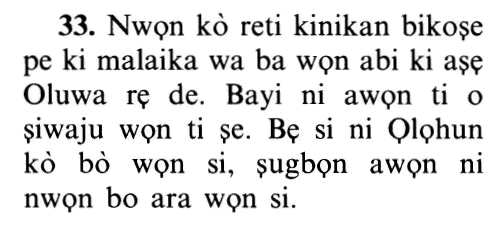16vs33
Select any filter and click on Go! to see results
هَلْ يَنظُرُونَ إِلاَّ أَن تَأْتِيَهُمُ الْمَلائِكَةُ أَوْ يَأْتِيَ أَمْرُ رَبِّكَ كَذَلِكَ فَعَلَ الَّذِينَ مِن قَبْلِهِمْ وَمَا ظَلَمَهُمُ اللّهُ وَلـكِن كَانُواْ أَنفُسَهُمْ يَظْلِمُونَ
Hal yanthuroona illa an tatiyahumu almalaikatu aw yatiya amru rabbika kathalika faAAala allatheena min qablihim wama thalamahumu Allahu walakin kanoo anfusahum yathlimoona
Index Terms
Click to play
Yoruba Translation

Hausa Translation
Shin sunã jiran wani abu? Fãce malã´iku su jħ musu kõ kuwa umurnin Ubangijinka. Kamar wancan ne waɗanda suke a gabãninsu, suka aikata. Kuma Allah bai zãlunce su ba, kuma amma kansu suka kasance sunã zãlunta.
Asbabu n-Nuzuul (Occasions of Revelation)
The Disbelievers' Refrain from Faith means that They were simply awaiting Punishment
Allah says:
هَلْ يَنظُرُونَ إِلاَّ أَن تَأْتِيَهُمُ الْمَلائِكَةُ أَوْ يَأْتِيَ أَمْرُ رَبِّكَ ...
Are they but waiting for the angels to come to them, or there comes the command of your Lord!
Threatening the idolators for their persistence in falsehood and their conceited delusions about this world, Allah says: Are these people waiting only for the angels to come and take their souls!
Qatadah said: أَوْ يَأْتِيَ أَمْرُ رَبِّكَ (Or there comes the command of your Lord),
"means the Day of Resurrection and the terror that they will go through.''
... كَذَلِكَ فَعَلَ الَّذِينَ مِن قَبْلِهِمْ ...
Thus did those before them.
means, thus did their predecessors and those who were like them among the idolators persist in their Shirk, until they tasted the wrath of Allah and experienced the punishment and torment that they suffered.
... وَمَا ظَلَمَهُمُ اللّهُ ...
And Allah did not wrong them.
because by sending His Messengers and revealing His Books He gave them enough warning and clearly demonstrated His proofs to them.
... وَلـكِن كَانُواْ أَنفُسَهُمْ يَظْلِمُونَ ﴿٣٣﴾
but they were wronging themselves.
meaning, by opposing the Messengers and denying what they brought.
يقول تعالى مهددا للمشركين على تماديهم في الباطل واغترارهم بالدنيا هل ينتظر هؤلاء إلا الملائكة أن تأتيهم لقبض أرواحهم قاله قتادة " أو يأتي أمر ربك " أي يوم القيامة وما يعاينونه من الأهوال وقوله " كذلك فعل الذين من قبلهم " أي هكذا تمادى في شركهم أسلافهم ونظراؤهم وأشباههم من المشركين حتى ذاقوا بأس الله وحلوا فيما هم فيه من العذاب والنكال " وما ظلمهم الله " لأنه تعالى أعذر إليهم وأقام حججه عليهم بإرسال رسله وإنزال كتبه " ولكن كانوا أنفسهم يظلمون " أي بمخالفة الرسل والتكذيب بما جاءوا به .
"هل" ما "ينظرون" ينتظر الكفار "إلا أن تأتيهم" بالتاء والياء "الملائكة" لقبض أرواحهم "أو يأتي أمر ربك" العذاب أو القيامة المشتملة عليه "كذلك" كما فعل هؤلاء "فعل الذين من قبلهم" من الأمم كذبوا رسلهم فأهلكوا "وما ظلمهم الله" بإهلاكهم بغير ذنب "ولكن كانوا أنفسهم يظلمون" بالكفر
هذا راجع إلى الكفار , أي ما ينتظرون إلا أن تأتيهم الملائكة لقبض أرواحهم وهم ظالمون لأنفسهم . وقرأ الأعمش وابن وثاب وحمزة والكسائي وخلف " يأتيهم الملائكة " بالياء . والباقون بالتاء على ما تقدم .
I'raab - grammatical analysis of the Qur'an
«هل ينْظُرُونَ» حرف استفهامَ ومضارع مرفوع والواو فاعلِ.
«إلَّا» أداة حصرَ.
«أنْ تَأْتِيَهُمُ الْمَلائِكَةُ» أن ناصبة ومضارع منصوب ومفعوله المقدم وفاعله المؤخر المصدر المؤول في محل نصب مفعول بهَ.
«أوْ يَأْتِيَ أَمْرُ» أو عاطفة ومضارع منصوب معطوف على ما قبله وأمر فاعلَ.
«ربِّكَ» مضاف إليه والكاف مضاف إليهَ.
«كذلِكَ» ذا اسم إشارة وهما متعلقان بمحذوف صفة مفعول مطلقَ.
«فعَلَ» ماض مبني على الفتح.
«الَّذِينَ» موصول فاعلِ.
«منْ قَبْلِهِمْ» متعلقان بمحذوف صلة والهاء مضاف إليهَ.
«وما ظَلَمَهُمُ اللَّهُ» الواو عاطفة وما نافية وفعل ماض ومفعوله المقدم ولفظ الجلالة فاعلهَ.
«ولكِنْ» الواو عاطفة ولكن حرف استدراك.
«كانُوا» كان واسمها والجملة معطوفةَ.
«أنْفُسَهُمْ» مفعول به مقدمَ.
«يظْلِمُونَ» مضارع مرفوع والواو فاعله والجملة خبر كانوا.
